英语:Unit3《Underthesea
- 格式:docx
- 大小:1.86 MB
- 文档页数:79
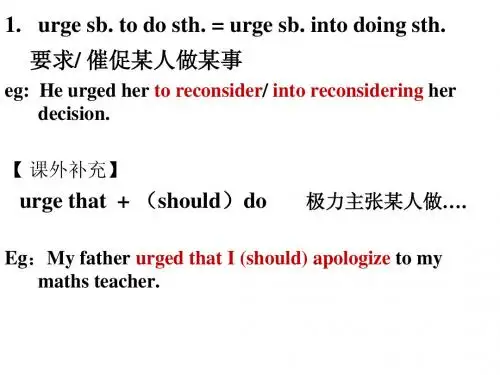
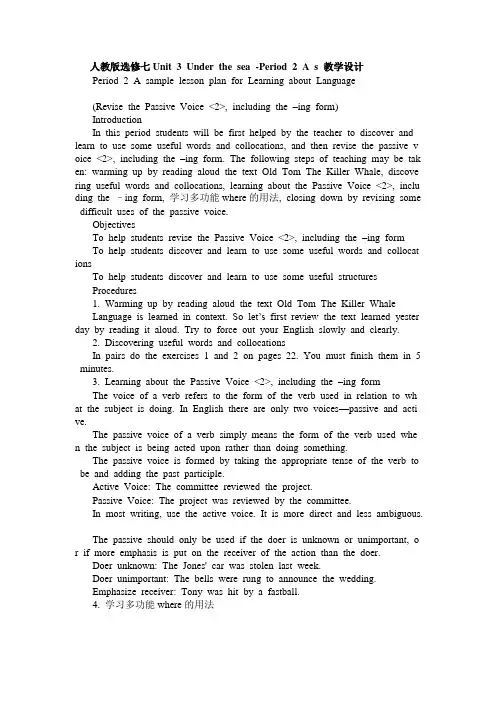
人教版选修七Unit 3 Under the sea -Period 2 A s 教学设计Period 2 A sample lesson plan for Learning about Language(Revise the Passive Voice <2>, including the –ing form)IntroductionIn this period students will be first helped by the teacher to discover and learn to use some useful words and collocations, and then revise the passive v oice <2>, including the –ing form. The following steps of teaching may be tak en: warming up by reading aloud the text Old Tom The Killer Whale, discove ring useful words and collocations, learning about the Passive Voice <2>, inclu ding the –ing form, 学习多功能where的用法, closing down by revising some difficult uses of the passive voice.ObjectivesTo help students revise the Passive Voice <2>, including the –ing form To help students discover and learn to use some useful words and collocat ionsTo help students discover and learn to use some useful structuresProcedures1. Warming up by reading aloud the text Old Tom The Killer WhaleLanguage is learned in context. So let’s first review the text learned yester day by reading it aloud. Try to force out your English slowly and clearly.2. Discovering useful words and collocationsIn pairs do the exercises 1 and 2 on pages 22. You must finish them in 5 minutes.3. Learning about the Passive Voice <2>, including the –ing formThe voice of a verb refers to the form of the verb used in relation to wh at the subject is doing. In English there are only two voices—passive and acti ve.The passive voice of a verb simply means the form of the verb used whe n the subject is being acted upon rather than doing something.The passive voice is formed by taking the appropriate tense of the verb to be and adding the past participle.Active Voice: The committee reviewed the project.Passive Voice: The project was reviewed by the committee.In most writing, use the active voice. It is more direct and less ambiguous.The passive should only be used if the doer is unknown or unimportant, o r if more emphasis is put on the receiver of the action than the doer.Doer unknown: The Jones' car was stolen last week.Doer unimportant: The bells were rung to announce the wedding.Emphasize receiver: Tony was hit by a fastball.4. 学习多功能where的用法where在英语中可以引导多种从句,是一个具有多重功能的引导词。
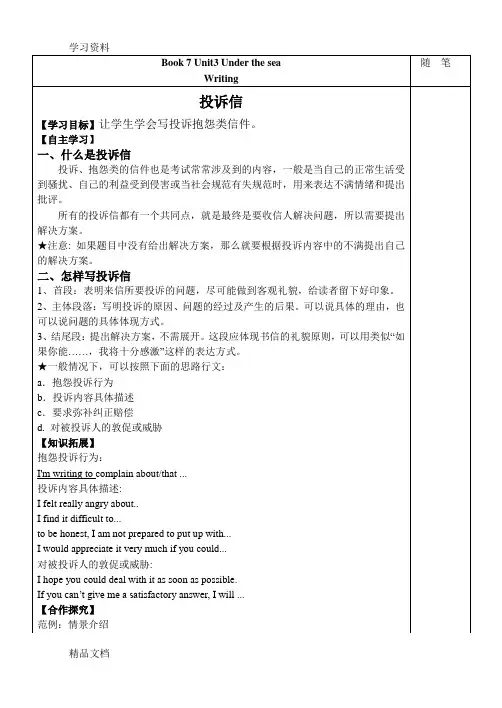
假如你是一名乘客,名叫李华,对这次航班不满意,理由有如下四个:(1)航空公司给你弄丢了一个重要的包,内有公司机密文件;(2)飞机迟到一个半小时;(3)飞机上的食物很差;(4)乘务员的服务态度不好。
(5)请就此事给航空公司写一封投诉信。
100词左右。
一.给出模版Dear_____:①My name is ......②I’m writing this letter about...... ③I’m sorry to say that I’m very unhappy about ...④ First of all,... ⑤ secondly,...⑥Thirdly,...⑦ Fourthly, I hate to say this, but...⑧ Honestly speaking,...⑨The focus of my complaint is ...⑩ I do hope... 二.范文My name is LuHua, a passenger of your airline. I’m writing this letter about your bad service.I’m sorry to say that I’m very unhappy about you airline. First of all, your airline lost one of my bags, in which there is an important paper of our company. Secondly, my plane was one and a half hour late. You know, I had to attend an important meeting in time. Thirdly, the food on the plane was terrible. Fourthly, I hate to say this, but I think the attendants (服务员)on the plane were unfriendly and impolite to me. Honestly speaking, this is the worst airline I know in the world. The focus of my complaint is where is my bags is.I do hope you can help me find my bag and improve your service.三.高考链接(08年湖北)假设你是卜曼宜,你购买了一部某外国公司生产的手机,因有质量问题,要求该公司更换。
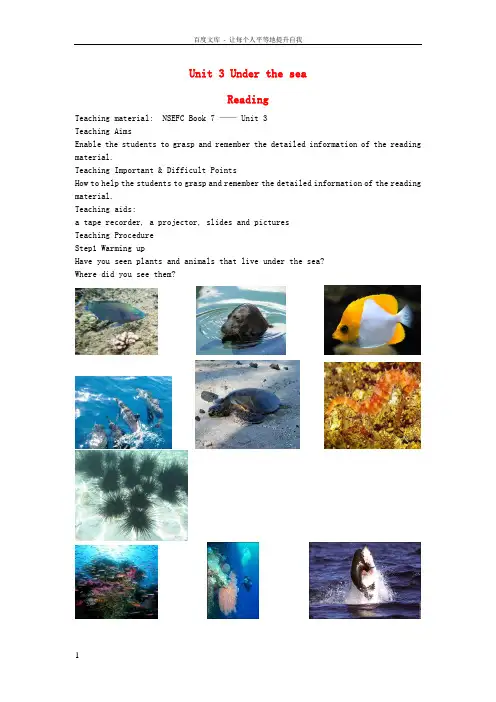
Unit 3 Under the seaReadingTeaching material: NSEFC Book 7 —— Unit 3Teaching AimsEnable the students to grasp and remember the detailed information of the reading material.Teaching Important & Difficult PointsHow to help the students to grasp and remember the detailed information of the reading material.Teaching aids:a tape recorder, a projector, slides and picturesTeaching ProcedureStep1 Warming upHave you seen plants and animals that live under the sea?Where did you see them?Step 2 Pre-readingWriter ClancyVocation A whalerStyle Anecdotestime At the beginning for the 20th centuryPlace AustraliaMain idea The killer whale help people to kill baleen whaleStep 3 ScanningScan the text, and fill in the blanks with names mentioned in the text.1. ___________was 16 years of age when he went to work at the whaling station. Clancy to go to the boat as there was a whale out there in the bay.3. _________was swimming by the boat showing the whalers the way.Clancy that they would return the next day to bring in the body of the whale. carried by the waves further and further away from the whalers.6. __________knew that Old Tom would protect James.Keys: 2. George 3. Old Tom 4. Jack 5. James 6. RedStep 4 SkimmingSkim the text and put the following sentences into a right order.( ) George started beating the water with his oar( ) Clancy jumped into the boat with the whalers.( ) Clancy arrived at the whaling station( ) The killers started racing between our boat and the whale( ) Clancy heard a huge noise coming from the bay( ) Clancy was sorting out his accommodation( ) Clancy ran down to the shore( ) The man in the bow of the boat aimed the harpoon at the whale Keys:Step 5 Careful readingRead the passage carefully and do the true or false questions.1. There was no evidence that Old Tom was helping out the whalers.2. The author compares the killer whales with a dog.3. The killer whales worked as a team.4. The killer whales dragged the whale under the water to feed on its body.5. The whalers returned home with the whale’s body.6. Old Tom didn’t help out James.Keys: FTTFFFStep 6 Detailed readingRead the passage carefully and answer the following questions.1. What evidence was there that Old Tom was helping out the whalers?Old Tom let the whalers know that there was a baleen whale nearby;He showed them the way to the whaleWork as a team2. What other animals did the author compare the killer whales with?Dogs.3. “The killers started racing between our boat and the whale just like a pack of excited dogs.” why do you think the killer whales behave like this? Because they knew that, together with the whalers, they would soon kill the bal een whale and get a good feed.4. Why did George think that the killer whales worked as a team?Because he could see that some of the killers were throwing themselves on top o f the whale’s blow hole while others were preventing it from swimming out to s ea.5. Why do you think the whalers allowed the killer whales to drag the whale und er the water to feed on its lips and tongue?Because they knew the Killer Whales would leave the rest of the body to them.6. Why did the whalers return home without the whale’s body?Because the body would not float to the surface until about 24 hours later. 7. How do you think Red felt about the killer whales?Red felt good about the Killer Whales. He appreciated the working relationship that the whalers had with the Killer Whales.8. How did Old Tom help James? Why do you think he did this?Old Tom prevented James from drowning. Old Tom wanted to help his human friend s.Step 7 DiscussionDiscuss the relationship between Old Tom and the whalers.What other animals do you know help out humans in hunting?Step 8 HomeworkReview the text and underline some difficult points.。
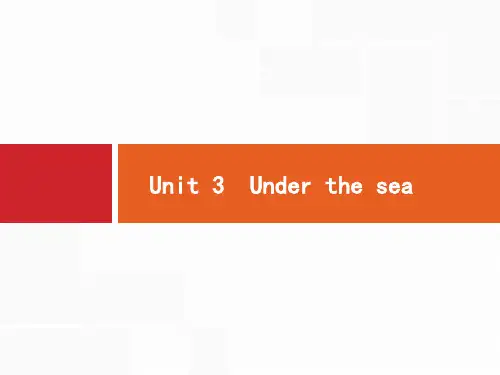
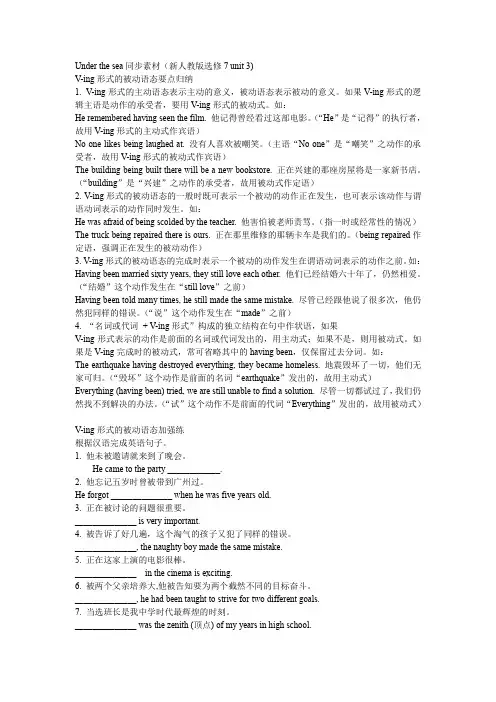
Under the sea同步素材(新人教版选修7 unit 3)V-ing形式的被动语态要点归纳1. V-ing形式的主动语态表示主动的意义,被动语态表示被动的意义。
如果V-ing形式的逻辑主语是动作的承受者,要用V-ing形式的被动式。
如:He remembered having seen the film. 他记得曾经看过这部电影。
(“He”是“记得”的执行者,故用V-ing形式的主动式作宾语)No one likes being laughed at. 没有人喜欢被嘲笑。
(主语“No one”是“嘲笑”之动作的承受者,故用V-ing形式的被动式作宾语)The building being built there will be a new bookstore. 正在兴建的那座房屋将是一家新书店。
(“building”是“兴建”之动作的承受者,故用被动式作定语)2. V-ing形式的被动语态的一般时既可表示一个被动的动作正在发生,也可表示该动作与谓语动词表示的动作同时发生。
如:He was afraid of being scolded by the teacher. 他害怕被老师责骂。
(指一时或经常性的情况)The truck being repaired there is ours. 正在那里维修的那辆卡车是我们的。
(being repaired作定语,强调正在发生的被动动作)3. V-ing形式的被动语态的完成时表示一个被动的动作发生在谓语动词表示的动作之前。
如:Having been married sixty years, they still love each other. 他们已经结婚六十年了,仍然相爱。
(“结婚”这个动作发生在“still love”之前)Having been told many times, he still made the same mistake. 尽管已经跟他说了很多次,他仍然犯同样的错误。
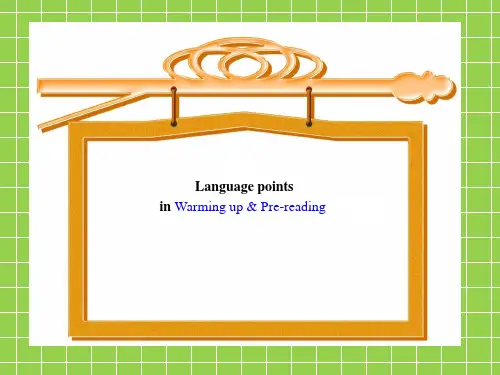
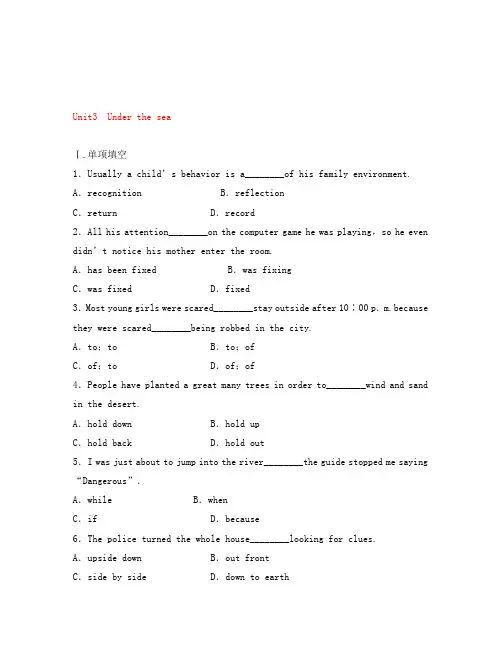
Unit3 Under the seaⅠ.单项填空1.Usually a child’s behavior is a________of his family environment. A.recognition B.reflectionC.return D.record2.All his attention________on the computer game he was playing,so he even didn’t notice his mother e nter the room.A.has been fixed B.was fixingC.was fixed D.fixed3.Most young girls were scared________stay outside after 10∶00 p.m.because they were scared________being robbed in the city.A.to;to B.to;ofC.of;to D.of;of4.People have planted a great many trees in order to________wind and sand in the desert.A.hold down B.hold upC.hold back D.hold out5.I was just about to jump into the river________the guide stopped me saying “Dangerous”.A.while B.whenC.if D.because6.The police turned the whole house________looking for clues.A.upside down B.out frontC.side by side D.down to earth7.The search was________when night came,even though the child had not been found.A.approved B.acquiredC.achieved D.abandoned8.All his classmates________his happiness when he won first prize in the competition.A.shared B.shared fromC.shared with D.shared like9.Before the storm,fishes in the pond usually________themselves out of the water to get fresh air.A.throw B.runC.swim D.escape10.It was really a________experience.Afterwards everybody was very________. A.terrifying;shocking B.terrified;shockingC.terrifying;shocked D.terrified;shocked11.Like some of my classmates,I cannot live up to my teachers’expectations;________I let them down.A.in other words B.after allC.what’s more D.more or less12.We are now enjoying the cool air in the room.________,the farmers are harvesting crops in the hot sun.A.Therefore B.BesidesC.As a result D.In the meantime13.We were________the most important scientific development of the century. A.seeing B.watchingC.looking D.witnessing14.—I’m dead tired.I can’t walk any farther,Jenny.—________,Tommy.You can do it.A.No problem B.No hurryC.Come on D.That’s OK15.________clearly aware of the danger ahead,he accepted the task without fear.A.As if B.ThoughC.If D.As thoughⅡ.完形填空(2020年江西师大附中、临川一中联考)Recently I’ve completed my college degree.Th e__1__course was sociology and the last project was called “smile”,which asked us to go out and smile at three people and__2__their reactions.It was freezing.My husband and I went out to McDonald’s.We were standing in line,waiting to be__3__,when all of a sudden everyone around us began to__4__away from their position.As I turned around I smelled a__5__“dirty body” smell,and there standing behind me were two poor__6__men.As I looked down at the short gentleman__7__to me,he was smiling and his beautiful sky blue eyes searched for__8__.To sit in the restaurant and__9__up,they had to buy something.When the young lady at the counter asked what they wanted,he said coffee because that was all they could__10__.I smiled and asked the lady for two more breakfast meals on two__11__plates.I then walked around the corner to the table that the men had chosen as a__12__spot.I put the plates on the table and__13__the blueeyed gentleman’s cold hands with my hands.With tears in his eyes,he said,“Thank you.” I noticed al lthe__14__in the restaurant were set on me.My husband__15__at me and gave me a big hug.I returned to college and handed in a paper about this story as my__16__to the instructor.She read it and then asked,“Can I __17__this?” I nodded.Just at that time I realized in my own way I had__18__the people at McDonald’s,my husband,the instructor,and every soul that shared the classroom.I__19__with one of the biggest lessons I would ever learn—unconditional acceptance.We shouldn’t__20__people based on their appearance.st B.firstC.hardest D.easiest2.A.recognize B.recordC.describe D.imagine3.A.paid B.treatedC.served D.charged4.A.throw B.giveC.take D.back5.A.horrible B.curiousC.dull D.familiar6.A.old B.healthyC.homeless D.disabled7.A.close B.dueC.superior D.similar8.A.assistance B.acceptanceC.advice D.admission9.A.break B.pickC.cheer D.warm10.A.afford B.enjoyC.spend D.drink11.A.big B.separateC.beautiful D.special12.A.resting B.eatingC.visiting D.watching13.A.shook B.sharedC.clapped D.covered14.A.customers B.handsC.eyes D.sounds15.ughed B.smiledC.shouted D.stared16.A.homework B.projectC.assignment D.achievement17.A.share B.spareC.care D.support18.A.involved B.contactedC.investigated D.touched19.A.graduated B.accomplishedC.disappeared D.succeeded20.A.estimate B.guaranteeC.judge D.approachⅢ.阅读理解(2020英语周报模拟十)Frankly,I appreciate myself very much.Yes,I admit I’m in many aspects not as good as other people,but I don’t think I’m always not good.When I find what I’ve done or written is okay,I’ll remain pleased with myself for quitea few days,and if I receive praise for it,I’ll even become so excited as to add a few words to reward myself.True,I’m not modest at all.People may call me conceited (自负的).But I think otherwise.I appreciate other people.I appreciate anything good.Isn’t it unfair to forget appreciating myself while appreciating others?We Chinese generally tend to be modest,and we take pride in being so.For example,a Chinese man will call his own wife zhuojing,meaning“my humble wife”,and his own writings zhuozuo,meaning“my poor writings”.But if you call his wife a “rustic (乡村的) woman” or his writings“trash”,he would,I’m sure,declare he would make a clean break with you angrily.As a matter of fact,there is probably no difference at all between what is said by him and you.I don’t think it’s wrong of you to freely praise yourself if you’re really worthy of praise.As we know,there is an old Chinese saying disparaging (蔑视) a melon seller,named Lao Wang,who keeps praising his own goods.Well,why can’t he praise his melons if they are really sweet and juicy?Lao Wang sells melons for a living.How could he carry on business if he,by imitating the affectations (装模作样) of us intellectuals,were to show false modesty about his melons?He would sure enough die of starvation. Selfappreciation is therefore a key to professional dedication and enjoyment of work.Needless to say,the same is true of those who make a living with their pen.One will lose confidence in writing when he stops admiring his own essays.1.We know from the first three paragraphs that the author________. A.is modest in some wayB.is pleased to be a good writerC.is too conceitedD.thinks it unfair to appreciate others2.What do we know about the author’s at titude towards Chinese modesty according to Paragraph 4?A.Supportive. B.Negative.C.Neutral. D.Careless.3.The author mentions the example of Lao Wang to prove that______. A.Lao Wang is very proud of himselfB.melon sellers should praise their goodsC.reasonable selfappreciation is goodD.writers should learn from Lao Wang4.The purpose of the passage is to encourage readers to be________. A.modest B.considerateC.respectful D.confidentⅣ.短文填词I am a photographer,or my job is taking pictures.As a young boy I was g________a very old camera.1.________Since that day I got lost________picturetaking.2.________There is no doubt that a picture can tell a thousandw________.When you click the camera3.________you________a moment.If you are taking a picture 4.________of a person,you record a moment in that p________5.________life,if you are taking pictures of a city,a building orwhatever,the moment you are________(记录) 6.________becomes a history.what I am________(忙碌) 7.________doing is to make a film about the city of Beijing,________I have lived for seven years and 8.________which has a rich history.From the beginning to the ________a lot of pictures are involved.9.________ I wish my understanding of Beijing could affectw________watches the pictures.10.________Ⅰ.单项填空1.B 本题考查近义词辨析。
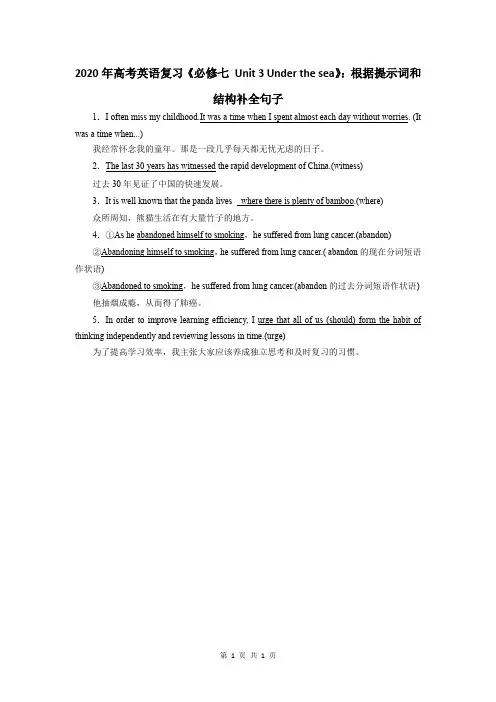
2020年高考英语复习《必修七Unit 3 Under the sea》:根据提示词和结构补全句子1.I often miss my childhood.It was a time when I spent almost each day without worries. (It was a time when...)我经常怀念我的童年。
那是一段几乎每天都无忧无虑的日子。
2.The last 30 years has witnessed the rapid development of China.(witness)过去30年见证了中国的快速发展。
3.It is well known that the panda lives where there is plenty of bamboo.(where)众所周知,熊猫生活在有大量竹子的地方。
4.①As he abandoned himself to smoking,he suffered from lung cancer.(abandon)②Abandoning himself to smoking,he suffered from lung cancer.( abandon的现在分词短语作状语)③Abandoned to smoking,he suffered from lung cancer.(abandon的过去分词短语作状语)他抽烟成瘾,从而得了肺癌。
5.In order to improve learning efficiency, I urge that all of us (should) form the habit of thinking independently and reviewing lessons in time.(urge)为了提高学习效率,我主张大家应该养成独立思考和及时复习的习惯。
第1 页共1 页。
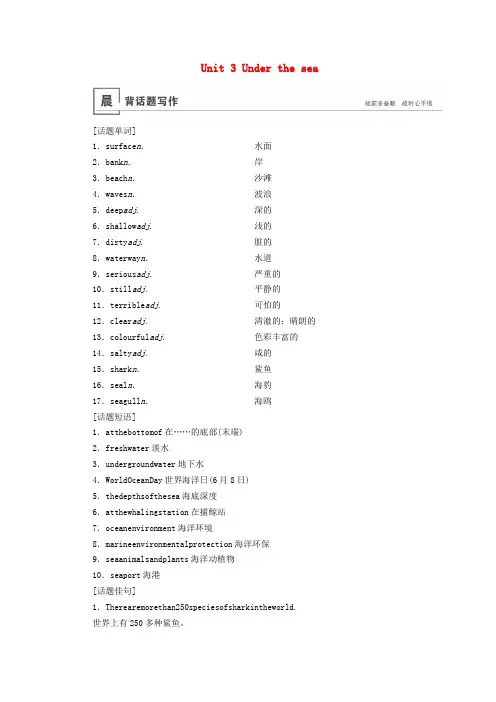
Unit 3 Under the sea[话题单词]1.surface n.水面2.bank n.岸3.beach n.沙滩4.waves n.波浪5.deep adj. 深的6.shallow adj. 浅的7.dirty adj. 脏的8.waterway n.水道9.serious adj. 严重的10.still adj. 平静的11.terrible adj. 可怕的12.clear adj. 清澈的;晴朗的13.colourful adj. 色彩丰富的14.salty adj. 咸的15.shark n.鲨鱼16.seal n.海豹17.seagull n.海鸥[话题短语]1.atthebottomof在……的底部(末端)2.freshwater淡水3.undergroundwater地下水4.WorldOceanDay世界海洋日(6月8日) 5.thedepthsofthesea海底深度6.atthewhalingstation在捕鲸站7.oceanenvironment海洋环境8.marineenvironmentalprotection海洋环保9.seaanimalsandplants海洋动植物10.seaport海港[话题佳句]1.Therearemorethan250speciesofsharkintheworld.世界上有250多种鲨鱼。
2.SharkiswidelydistributedalongtheAtlanticcoast.鲨鱼在大西洋沿岸的分布很广泛。
3.Mostpeoplefailtorealizethatsharkattacksdon’thappenveryoften.大多数人都不了解,鲨鱼其实很少攻击人类。
4.Thechancesofbeingattackedbyasharkareverysmallcomparedtootherdangers.和其它危险相比,被鲨鱼袭击的可能性是非常小的。
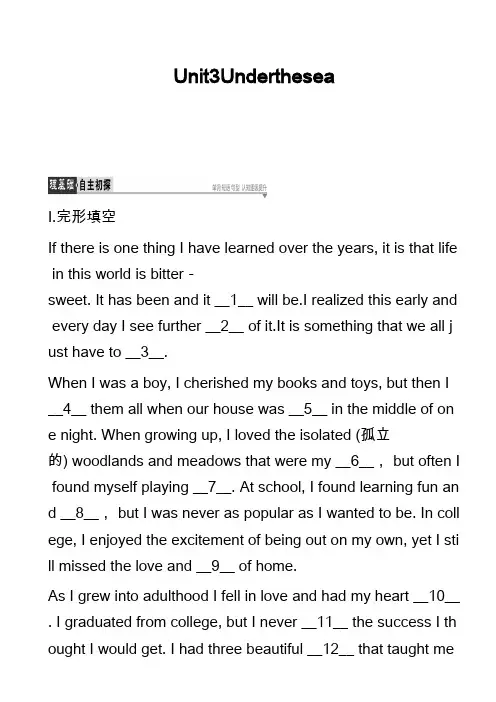
Unit3UndertheseaⅠ.完形填空If there is one thing I have learned over the years, it is that life in this world is bitter-sweet. It has been and it __1__ will be.I realized this early and every day I see further __2__ of it.It is something that we all j ust have to __3__.When I was a boy, I cherished my books and toys, but then I __4__ them all when our house was __5__ in the middle of on e night. When growing up, I loved the isolated (孤立的) woodlands and meadows that were my __6__, but often I found myself playing __7__. At school, I found learning fun an d __8__, but I was never as popular as I wanted to be. In coll ege, I enjoyed the excitement of being out on my own, yet I sti ll missed the love and __9__ of home.As I grew into adulthood I fell in love and had my heart __10__ . I graduated from college, but I never __11__ the success I th ought I would get. I had three beautiful __12__ that taught meso much about love, yet I watched my two sons __13__ daily with Autism (孤独症). I cherished the love that my Mom and Dad gave me, and then I __14__ them die before I was 50.Life is bitter-sweet which is full of ups and downs, twists and turns, succes ses and __15__. Whether life makes us bitter or sweet, __16_ _, is up to us. Anyhow, we could __17__ something from it. It is during the __18__ times that we grow the strongest and our goodness is most __19__. Stay strong. Love much. Live well. Please __20__ your goodness and make this world a sweeter place for all.篇章导读:本文是一篇议论文。
一、单词拼写1. He to_______(作证) having seen the man enter the building.2. I will do my utmost to help you find________(住处) .3. In his early days he ______ (放弃) medicine for literature.4. Hearing that the famous star was about to appear, the fans y__________ and cheered.5. We hope to have an income of an average a_________ growth rate of 10%.6. The escaped prisoner was _____________ (拉) out of the cave.7. Gina's ____________ (语言) is so sharp that it will get her into trouble one day.8. He told us some amusing _________ (轶事) of the President's childhood.9. They had an ____________ (令人敬畏的) task ahead.10. Human brains contain more than 100 million __________ (细胞) per cubic (立方) centimeter.二、翻译以下短语1.扯进来:赚得 ________________ 2.在远处 __________________3.帮助(摆脱困境) ________________ 4.一群 ___________________ 5.正要做某事 __________________ 6.吓死了 __________________7.仔细考虑 ____________________ 8.意识到 __________________9.与此同时,在此期间 ______________ 10.颠倒 _________________11. 听说 __________ 12. 亲眼看到 ___________13. 分类,整理________ 14. 大声喊叫___________15. 快点 ______________ 16. 跑在…前__________17. 给某人领路__________ 18.在远处 _______19. 因为…很害怕__________ 20. 抬高,举起 ___________三、用本单元相关短语完成下面的句子。
Unit 3Under the sea1.witness vt. 当场见到;目击;见证n. 目击者;证人;证据①He witnessed to having seen the man enter the room.他证明看到那个人进了房间。
②The police found the witness to the murder case.警察找到了那个谋杀案的目击者。
The witness(目击者)who witnessed(目击)the incident gave witness(证据)to the police and promised to be a witness(证人).[运用提升]After the explosion, the policemen did a lot of work to find out some clues from the________.A.onlookersB.viewersC.people D.witnesses2.urge vt. 催促;极力主张;驱策(3)have an urge to do sth. 迫切要求做某事①Brown urged her to reconsider her decision. 布朗极力劝说她重新考虑自己的决定。
②I urged that he(should)do his best. 我强调他要尽自己最大的努力。
③It was urged that he(should)be punished. 有人极力主张他应受到惩罚。
翻译句子(1)他极力劝她学习物理。
________________________________________________________________________(2)他们敦促我去申请工作。
________________________________________________________________________(3)她渴望当一名电影明星。
Unit 3 Under the SeaWarming up and ReadingI.教学目标1. Help Ss to learn some useful new words and expressions2. Improve Students’reading ability.3. Stimulate students’love to the nature.II.教学重点和难点1. 教学重点(1) Get students to know some useful new words and expressions.(2) Develop students’ reading ability.2. 教学难点(1) Enable Ss to grasp some reading skills such as skimming and scanning.(2) Enable Ss to retell a story correctly.III.课时安排1课时IV.教学步骤:Period 1 Warming up, Pre-reading, Reading & ComprehendingT eaching Goals:1. To arouse Ss’ interest in animals and plants living under the sea.2. To develop Ss’ reading ability.3. To appreciate how the writer describes movements.T eaching Procedures:Step 1. Leading-inPurpose: To arouse Ss’ interest in the content of this unit.1. Ask Ss to collect information about sea animals and plants and answer the followingquestion.Can you name some animals and plants living under the sea? What’s you favorite? Speak about it.2. Ask Ss to collect information about whales and answer the following question.(1) Are whales fish? How do you know?(2) What is a killer whale? What do you know about it?Step 2. Warming upPurpose: To get Ss to know something about the content of this unit.1.Get two or three Ss to talk about their favorite animals or plants under the sea. And ask Ss toanswer the following question.From where did you learn this?2. Ask Ss to look at the three pictures of Warming Up on P19 and answer the following questions.(1)What are your favorite sea plants and animals(2)Where can you find them?(3)If possible, would you like to keep some at home?Step 3. Pre-readingPurpose: To get the Ss prepared for reading the text.1.Ask Ss to talk about whales. T eacher may say, “Today, we are gong to read a story of alarge animal living in the sea, a killer whale. Do you think whales are fish? Why do you say so? Then get one of two Ss to talk about whales.”2.Ask Ss to look at the picture of Pre-reading and answer the following questions.(1)what do you think is happening?(2)What is a killer whale? Can you tell me about it?Step 4. Fast readingPurpose: To get Ss to read for the general idea.1.Ask Ss to read the text fast and sum up the main idea of the text and answer the followingquestion.In what person is the text written?Suggested Answer: The text is written in the first person.2.Play the tape and ask Ss to read after it.Step 5. Intensive readingPurpose: To develop Ss’ reading ability of scanning.1.Play the tape again sentence by sentence and ask Ss to underline what they cannot understand.2. Ask Ss to discuss what they have underlined.3. Read the following sentences and ask Ss to find whether they are true or false.(1)The writer didn’t believe that killer w hales could help whale hunters until he saw it withhis own eyes.(2)When the writer heard the great noise, he knew that a killer whale was telling them thatthere was a whale nearby.(3)Gorge could hardly wait to hunt a whale and followed the killer without putting on rightclothes.(4)Gorge beat the water with his oar so that the killer could swim faster.(5)There were altogether seven killers attacking a whale.(6)After the whale died, the hunters dragged it home.(7)It was a shark that saved James after he fell into the sea.4. Ask Ss to make a dialogue according to the questions in Ex1 of Comprehending on P21 and then act it out.Step 6. Language points (1)Purpose: To learn the language points in the text.1. Present the following phrases on the blackboard. Ask Ss whether they are what they have underlined and then ask them to translate them into Chinese. Finally, get them to remember the sentences containing these phrases.2. Lead Ss to deal with the following language points.(1) crash (line 9,para.2): fall or strike (sth.)suddenly and noisilyThe huge rock crashed down onto the car. 巨石砸在了车上。
Book 7Unit 3Under the seaⅠ.单句语法填空1.It takes the boy most of his free time to learn drawing.2.Over the past 40 years,China has witnessed(witness) dramatic changes.3.I was about to do an important piece of work when my daughter came to interrupt me.4.Seeing the front door being painted(paint),he had to enter the room through the back door.5.Where there is water,there is life.6.The truck was found abandoned(abandon) by the side of a rural road late the next day.7.Frozen fish isn’t as tasty(taste) as the fresh one.8.This morning I received a telephone call from my dentist,urging me to come(come) to his practice for immediate treatment of my teeth.9.After I heard the terrifying news,nothing could have stopped me from feeling scared(scare) to death.10.I must reflect on/upon how to answer that question.Ⅱ.单元知识运用写作素材(关于帮助)1.Smart是我的导盲犬,经常救我于危难之中。